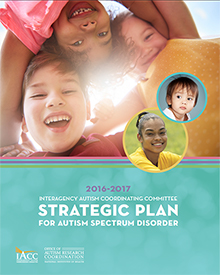- For Immediate Release
Monday, October 23, 2017 - Contact: Office of Autism Research Coordination/NIH
Email: IACCPublicInquiries@mail.nih.gov
2016–2017 IACC Strategic Plan Addresses Critical Gaps and Opportunities in Autism Research and Services

The Interagency Autism Coordinating Committee (IACC) has released its 2016 – 2017 Strategic Plan for Autism Spectrum Disorder (ASD). The new IACC Strategic Plan meets the requirements of the Autism Collaboration, Accountability, Research, Education, and Support (Autism CARES) Act of 2014 and includes objectives that encompass ASD research and services activities. The structure of the plan remains the same as in previous years, with the 23 new objectives categorized around seven community-based questions about ASD. The 23 objectives build upon progress made on meeting objectives from the 2009 IACC Strategic Plan and subsequent updates. Notably, in the new IACC Strategic Plan, the Committee recommends a doubling of the government and private autism research budget from the 2015 level of $343 million to $685 million by the year 2020. This increased investment will allow researchers to take advantage of opportunities to rapidly add to the evidence base that can support: improved understanding of ASD, including in special populations such as women and girls; improved early detection and interventions; reduction of the impacts of co-occurring physical and mental health conditions, to prevent premature death and promote quality of life; enhanced services and supports for transitioning youth and adults on the spectrum. Overall, the Committee hopes that the 2016-2017 IACC Strategic Plan will provide Congress, Federal agencies, advocates, and people on the autism spectrum and their families with comprehensive information on the state of autism research and services in 2017 and priorities for future progress.
***
The IACC is a Federal advisory committee that was created by Congress in an effort to accelerate progress in ASD research and services. The IACC works to improve coordination and communication across the Federal government and work in partnership with the autism community. The Committee is composed of officials from many different Federal agencies involved in autism research and services, as well as adults on the autism spectrum, parents and family members of individuals on the autism spectrum, advocates, researchers, providers, and other public stakeholders. The documents and recommendations produced by the IACC reflect the views of the Committee as an independent advisory body and the expertise of the members of the Committee, but do not represent the views, official statements, policies or positions of the Federal government. For more information on the IACC, please visit: www.iacc.hhs.gov.


